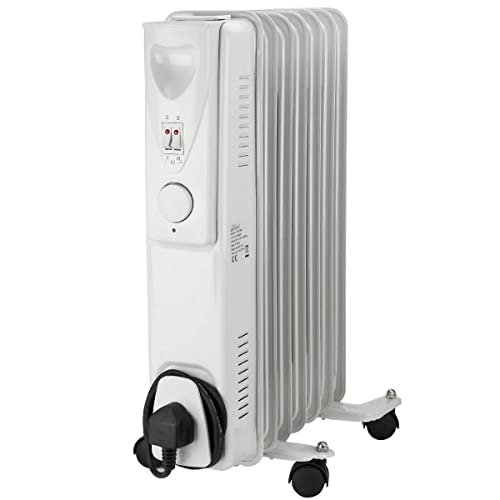
3
AugustYou'll Never Guess This Small Oil Radiator's Benefits
Why Choose a Small Oil Radiator?
Filled with thermal fluid and fitted with a heating element oil radiators provide long-lasting warmth by convection and radiation. They're also portable and allow you to heat the space you're in and not wasting energy in empty areas.
 They are extremely energy efficient and require little maintenance. All that is needed is just a few wipes with a damp cloth. They can be placed on their sides and perform effectively.
They are extremely energy efficient and require little maintenance. All that is needed is just a few wipes with a damp cloth. They can be placed on their sides and perform effectively.
Safety
Like the name suggests oil radiators are a form of portable heater that uses an internal reservoir of mineral or engine oil to heat a room. They resemble traditional radiators but are smaller and less bulky. They can easily be moved around a room on their wheels or with an adjustable handle. They are connected to electrical supply of the home via a standard wall plug. A majority of these radiators come with a 24-hour clock that allows you to set start and stop times for heating.
When you turn the heater on the electrical current flows through a metal resistive wire that is located in the base of the radiator. This friction warms the oil molecules. As the oil molecules expand, they push any cooler oil back towards the element, which is heated. This process continues for as long as the heating element is on.
These heaters should not be installed near water sources like a bath or sink. Carbon monoxide is generated by these heaters, and is deadly if inhaled. It is also recommended to keep them out from materials that ignite, such as draperies and wallpaper.
Many people wonder whether or not radiators that are filled with oil are safe, and in the event they are, for how long. The answer is yes, they are safer than other types of heaters. They are more secure than other kinds of heaters. They make use of an internal oil tank to provide the heat in a safe manner.
This is because they don't contain heating elements that could ignite or catch fire, and there is no need to replenish them unless the tank is completely empty. It is essential to select the correct extension lead. Never use one that isn't rated for your heater. This will stop the wires from being overheated and causing an injury.
The tip-over switch is a further safety feature. It will shut down the device if the device is knocked over or tipped. This protects against accidental or intentional mishaps, which could otherwise cause serious injuries.
Energy Efficiency
The energy efficiency of a tiny oil radiator makes it an affordable heating option for those concerned about skyrocketing electricity bills. Oil heaters are energy efficient and provide long-lasting heat without increasing the cost of your energy bill. They do this by retaining heat, and using thermostats to keep the right temperature. While these radiators do consume electricity, they use it in a minimal and environmentally friendly way.
Oil-filled radiators are rated at more than 99 percent energy efficiency. That's because they convert every watt of electrical power directly into thermal energy with minimal loss along the way. This is far more efficient than conventional radiators that depend on air convection and fans to circulate heat around the room. This kind of radiator makes use of thermostats to keep a consistent temperature and turn off when the room isn't being used, which can aid in reducing unnecessary energy consumption.
The amount of electricity used by a radiator depends on a number of factors, including the radiator's wattage and the size of the space it's designed to heat. Generally, the more wattage the radiator has, the faster the heater warms up and can be able to heat more of the area. This also means that it will use more power than a model with a lower power.
The amount of energy used can also be affected by other factors, such as the size of the room as well as its insulation. If a room is not properly insulated it will require more heat required to be comfortable. This will result in the use of more electricity. Some thermostat settings can also cause the heater to turn off and on more frequently than necessary to keep the temperature at a comfortable level.
If you follow a few simple energy-saving tips you can reduce the amount of energy your radiator uses. This includes switching off your radiator when you're not in the room, and adjusting the thermostat to a more efficient setting, and making sure that any drafts are closed.
Durability
Oil radiators are excellent because they retain heat very well. This means that even after you've shut off the heat, they can keep a room warm for many hours. This means that they aren't making more energy than they need to, which is one of the reasons why these types of heaters tend to have lower energy costs than fan-powered heaters.
This could also mean that they take longer to reach the maximum temperature, and are slow to warm up overall. This is why it's essential to take the time to research all of your options before purchasing and taking into consideration all of the factors that influence which heater is best suited to your needs.
The weight and size of a portable oil heater are also crucial factors to consider. If you're looking for a product that's easy to move around, then an ultra-light model is ideal and for those with mobility or vision issues it's worth considering how easily the heater can be utilized.
For instance, if you opt for a model that has a digital control panel then this can be difficult for those with mobility or eyesight difficulties to use. On the other hand models that are more traditional and have an easy on/off switch and a dial which is clearly marked with'min' and'max which are great for people who struggle to operate complicated electronic devices.
While it is incredibly uncommon for a small oil radiator to leak, the potential for this happens and should be taken into consideration before purchasing. Leaks from these heaters could cause significant damage if treated quickly. They can also pose a health risk if they get into your breathing space.
This can be avoided by storing the radiator upright always. This will stop any damage and ensure that it works properly. Alternately, you can choose a radiator that has a vented system which is designed to circulate the oil inside, even when it's being used on its side.
Easy Maintenance
Oil filled radiators are a great choice for those looking for an easy-to-use heater that can warm their home in a stylish and efficient manner. These heaters are one of the most popular models of our online collection and are perfect for heating small areas within the home. They are also among the most affordable alternatives in our electric heating review.
As the name suggests an oil-filled radiator is a kind of space heater that is made of mineral oil which is warmed by an electric heating element. The oil is heated to the point that it can heat a room for several hours with less energy. They look like central heating radiators, but they are smaller and lighter. They are, therefore, more portable. They are typically connected to the electricity of your home through a standard plug. They also have wheels or carrying handles for easy mobility.
In terms of maintenance, these radiators require little in terms of repairs. If they do leak, then you must never attempt to refill them yourself - this is a job for a professional as the oil inside is under pressure and could cause a fire hazard. If you think your heater might be leaking, you should contact the manufacturer immediately.
The De'Longhi Nano 500W Oil Filled Radiator heater is by far the most affordable of our round up of heaters to run but it only provides a modest amount of heat so may not be suitable for larger rooms. The more powerful models, like the De'Longhi Dragon 4 oil filled radiator with thermostat Filled Radiator or the VonHaus 11 fin 2500W oil filled radiator, can generate more heat with the same amount of power and are better suited to most homes.
It's also important to consider the size of the radiator prior to buying, particularly if you have vision or mobility issues. A majority of the models we've looked at feature an LCD display on the control panel that may be difficult to read for those with poor vision. VonHaus and De'Longhi come with large controls with clearly marked markings, so they should be easy for anyone with this kind of difficulty to operate.


Reviews